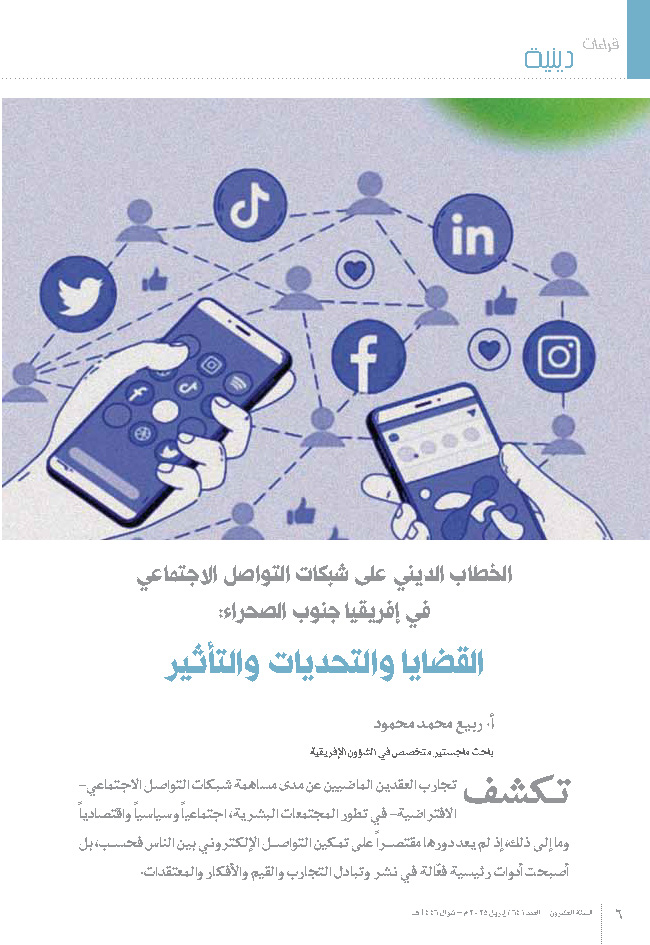Publisher: Qira’at Afriqiyah Magazine
Issue: 64, Aprill 2025
ISSN: 2634-131X
Year : 20
Pages: 6-19
Author: Rabie Abu Zamil
Download pdf

Abstract:
Social media networks are no longer limited to facilitating communication between people; rather, they have become a crucial and effective tool for disseminating and exchanging experiences, values, ideas, and beliefs. With the increasing use of these platforms, "technical and discursive" opportunities and challenges have emerged for actors and influencers in the religious sphere, necessitating a reassessment of how religious discourse presented on these networks aligns with the issues of various societies. Taking Sub-Saharan Africa into account, the central issue of this study revolves around understanding the nature and dynamics of virtual religious discourse within African communities, identifying its key issues, the challenges it faces, the extent of its impact, and how this impact can be measured. The study also examines a set of digital indicators related to the use of virtual networks, the evolution of religious discourse, and the religious landscape of the region. The study adopted a qualitative research methodology, incorporating a review of relevant literature and a case study approach, in addition to utilizing observation and content analysis of virtual religious discourse. It focused on four Facebook accounts—Facebook being the leading platform in both Africa and the world—belonging to two Islamic influencers: Ismail Menk, the Mufti of Zimbabwe, and Nigerian preacher Abdul Hakim Abdul Latif; as well as two Christian influencers from the Pentecostal movement, given its shift from the margins to the center of public discourse: Winners' Chapel International and its Nigerian founder, David Oyedepo, alongside Malawian pastor Shepherd Bushiri. The analysis period was limited to one month (October 2024) due to considerations related to the study’s scope and the difficulty of addressing all its variables within a single research endeavour. The study’s findings revealed the diversity and interactive nature of virtual religious discourse, encompassing religious preaching, social engagement, and political commentary in Sub-Saharan Africa, with influences from local, regional, and international contexts. In terms of thematic focus, Islamic discourse emphasized fatwas, sermons, community awareness, family guidance, good governance, and commercial transactions, in addition to addressing major global issues such as the Arab-Israeli conflict. In contrast, Pentecostal Christian discourse centered on digital evangelism, the theological interpretation of poverty and prosperity, and alignment with global Zionist narratives, supporting Israel’s efforts to penetrate African communities. The major challenges facing virtual religious discourse—which also reflect its impact—include the digital divide, linguistic and cultural diversity within African societies, and restrictions imposed on certain Islamic content. Additionally, internal challenges have emerged, such as the influence of extremist currents on Islamic discourse, while Pentecostal discourse faces the dilemma of translating its spiritual promises into tangible realities in societies grappling with economic and social crises.
